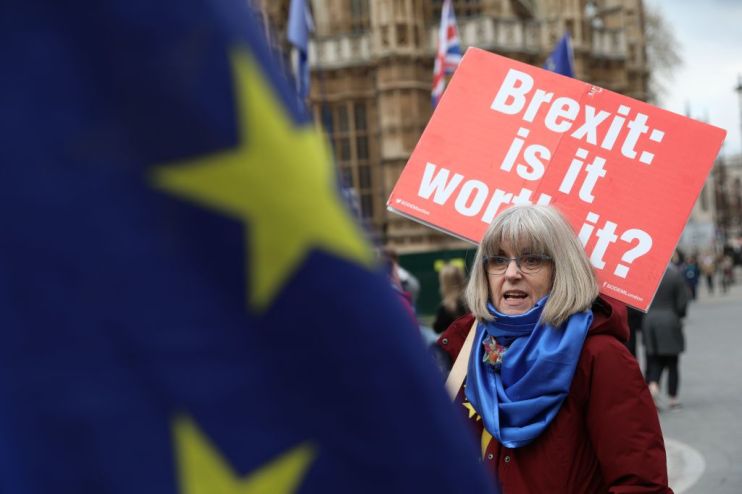Boris’ Brexit blindside: What the hell just happened?

Boris Johnson has put the cat among the pigeons by asking the Queen to suspend parliament for nearly five weeks, reducing the amount of time parliament sits before the critical Brexit Halloween deadline.
Remainers are outraged. Brexiters are sceptical. But what happens next?
Is proroguing parliament legal?
That’s a tough one. Certainly, Johnson’s team wanted to check first. There are many grumblings about it being unconstitutional, or a constitutional outrage, and that it could set a dangerous precedent.
It is unusual, in that normally prorogation lasts just a few days. But so far no one appears to have suggested Johnson and his adviser Dominic Cummings – who famously has little respect for parliamentary norms – can’t do it. However, a case in the Court of Session in Edinburgh, testing the legality of prorogation, is expected to conclude next week.
Can the Queen refuse to suspend parliament?
There have been calls – some of them less than polite – for the Queen to simply refuse to suspend parliament. Pro-Remain MPs are signing an early day motion, calling for Her Majesty not to prorogue parliament before 8 November. But this is incredibly unlikely to stop things.
As a constitutional monarch, her power is limited – indeed as Walter Bagehot once noted, the monarch “must sign her own death warrant if the two Houses unanimously send it up to her”.
Clearly, that’s not the case here, but our long-reigning monarch Elizabeth II has made an art form out of avoiding controversy. Sticking with convention and signing off on the PM’s request is probably – for her – the lesser of two evils.
Update: The Queen approved Boris Johnson’s request this afternoon
How significant is this?
It depends on your perspective, and what you were expecting to happen before 31 October, but as a symbol of Johnson’s respect for parliamentary conventions it’s not great.
In practical terms, it can be argued both ways. On the one hand, MPs are only losing around a week of session time. But, as we all know, a week is a long time in politics.
In addition, Remainers were expected to block conference recess, which would have given MPs longer to act. They do still have time, but any legislation that is incomplete ahead of suspension will fail, meaning MPs would have to pass any anti-no deal legislation in its entirety either before prorogation, or in the three weeks before Brexit day.
There are already some big set pieces, such as chancellor Sajid Javid’s spending round, which will take up some of the time MPs do have. The Queen’s Speech alone will require four days of debate, blocking out further time. You can probably expect more to be added to the diary.
Can parliament still stop a no-deal Brexit?
Things have definitely got a lot harder, but it’s not impossible. The parliamentary timetable has been reduced, but there is some time – perhaps as little as three days – before the Queen’s Speech on 14 October.
Yesterday they agreed to try and push through a recycled version of the Cooper-Letwin bill which was used to force Theresa May into the last Brexit extension.
Now a vote of no confidence (VONC) – relegated at yesterday’s meeting – is being hastily revived. But to work, it will require parties who have thus far shown little sign of unity really pulling together. And it’s not without risks of its own.
Will there be a general election?
That is a probable outcome of the VONC, but it’s a high risk strategy. If we have an election before 31 October, Labour leader Jeremy Corbyn has pledged a public vote, which will win over Remainers, but might put off those who want an ‘orderly’ Brexit.
Given Corbyn’s lukewarm attitude towards a second referendum, there is no guarantee Labour could coax arch-Remainers back from the Lib Dems.
Meanwhile Conservatives, currently riding high in the polls, could stand on a promise of taking the UK out of the EU, regaining voters previously lost to Ukip or The Brexit Party. And that’s only if the election is before 31 October – of which there are no guarantees.
Are we definitely heading for a no-deal Brexit?
Not yet. Johnson has been categorical that he is “energetically” seeking a deal, and has put the responsibility for that at the EU’s feet.
His demand is that they agree to reopen the Withdrawal Agreement, take out references to the backstop, and kick a decision on the Irish border into the long grass (or rather, the end of the transition period, currently set for December 2020).
The EU has insisted the agreement is “closed” – but last week, we saw a softening of the position, with both Angela Merkel and Emmanuel Macron agreeing that some small changes could be made. Their pre-requisite is a “practical” solution.
Johnson will have to offer more than repeated references to the trusted trader scheme, which withered on the vine under his predecessor.
Is there time to get a Brexit deal through parliament?
Johnson says yes. His letter to MPs sets out a timetable in which a new deal is agreed during the October European Council, from 17-18 of the month, and brought before MPs for a vote on 21 and 22 October. He says MPs will have to “move at pace to secure its passage before 31 October”, and for once he’s not exaggerating.
What do Brexiters think?
Johnson has definitely upset the Remainers. But he hasn’t necessarily won over the arch-Brexiters. Mark Francois has said that he and others in the Eurosceptic ERG will block any attempt to pass the Withdrawal Agreement, even without the backstop. Despite all his energy, Johnson may find he is up against the same struggle his predecessor faced.